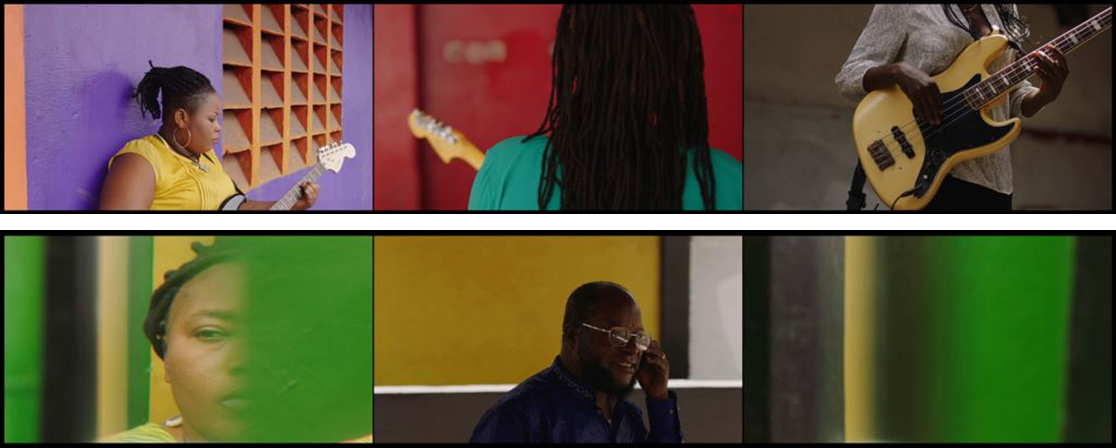56. Biennale – Personne et les autres

Il progetto Personne et les autres, Vincent Meessen and guests rappresenta il Belgio alla 56. Biennale di Venezia.
Comunicato stampa
The Belgian Pavilion at the 56th Venice Biennale will present the work of Belgian artist Vincent Meessen together with international guest artists. Meessen’s proposal Personne et les autres breaks the tradition of Belgium’s representation in Venice to date, which has mostly featured solo or duo exhibitions of Belgian artists. It challenges the notion of national representation, by moving away from the traditional format of a solo show and opening up to include multiple positions and viewpoints.
Working in close collaboration, Meessen and Brussels-based curator Katerina Gregos have developed an international, thematic and contemplative group exhibition of a poetic and political nature, grounded in research-based practices. The exhibition welcomes ten other artists from four continents and – for the first time in the Pavilion – artists from Africa, all of whose work has explored the question of colonial modernity, and most of whom are producing new work for the exhibition.
The title of the exhibition, Personne et les autres, is borrowed from a lost play by André Frankin, a Belgian art critic affiliated with the Lettrist and Situationist Internationals. The exhibition takes the history of the Pavilion and the international context of the Biennale as its point of departure; the Belgian Pavilion itself was the first foreign Pavilion to be built in the Giardini in Venice. This was during the reign of King Leopold II, a year before Congo Free State (Leopald II’s private property, claimed during the imperial powers’ ‘Scramble for Africa’ in the late nineteenth century) was handed over to the Belgian State.
The exhibition explores the consequences of political, historical, cultural and artistic entanglements between Europe and Africa during the time of colonial modernity, and in its aftermath. It probes unknown or overlooked micro-histories, brings into view alternative versions of modernity that emerged as a result of colonial encounters, and recounts stories that unfolded outside of and in reaction to accepted colonial hierarchies. The project aims to provide insight into the diverse forms – whether artistic, cultural, or intellectual - that were produced during this time. It calls into question the Eurocentric idea of modernity by examining a shared avant-garde heritage, marked by artistic and intellectual cross-pollination between Europe and Africa.
Personne et les autres traces, through the work of the artists, a timeline of references that connect the critique of colonial modernity with Dada, CoBrA and the Situationist International (1957-1972) - the last of the international avant-garde revolutionary movements whose final conference took place in Venice in 1969, and the emancipation of black people, Pan-Africanism, African independence movements, and ‘Global 68’ (the lesser known off-shoot of May 1968 in the Global South).
Central to the exhibition concept is a new audio-visual work by Vincent Meessen, which revisits the role of the largely unknown Congolese intellectuals within the Situationist Internationals. The artist unexpectedly discovered an unpublished document: the lyrics of a protest song, signed by a former Situationist, Joseph M’Belolo Ya M’Piku. Written in Kikongo in May 1968, the document revealed a completely unknown episode in the history of the Situationist Internationals. Meessen worked with the author of this song to re-interpret the text in the form of a musical work: a rumba, recorded in Kinshasa in the nightclub Un Deux Trois that was established in 1974 by the legendary Congolese musician and bandleader Franco Luambo (1938 –1989), bandleader of the famous orchestra TPOK Jazz.
It is important however to highlight that Personne et les autres does not focus only on the colonial history of Congo and Belgium, but on a broader critique and analysis of colonial modernity, challenging its official histories, addressing its blind spots, and re-inscribing what has been absent, erased or marginalised into the present. By exploring both adverse and positive cultural outcomes of colonial history, the exhibition reveals the fruitful, polyphonic and heterogeneous artistic and intellectual dialogues under colonisation during liberation struggles, most prominently in the aftermath of independence. At the same time, it reflects on the meaning of groundbreaking, emancipatory and oppositional practices (cultural or otherwise) related to that epoch, in light of the present global situation of unrest and crisis, with a view to alluding to potentialities for the future.
Vincent Meessen will be exhibiting alongside:
Mathieu K. Abonnenc (1977, French Guiana; lives and works in Metz)
Engaged with film history and the decolonisation of African states in the 1960s, Mathieu K. Abonnenc investigates the history of colonial development, the causes of collective amnesia and its effects on cultural identity and global contexts. His new work for the Pavilion will re-visit the figure of Victor Schœlcher (FR, 1804-1893) who propelled the abolition of slavery in France's overseas territories.
Sammy Baloji (1978, Democratic Republic of Congo; lives and works in Lubumbashi and Brussels)
Sammy Baloji probes methods of segregation during colonisation in the Congo through the exploration of urbanisation and industrialisation, by combining a recent photographic work Essay on Urban Planning (2013) with a new work produced for the Pavilion that will connect the surveillance activities of the Belgian secret services in Congo, to indigenous secret societies, and the copper trade.
James Beckett (1977, Zimbabwe; lives and works in Amsterdam)
By tasking an industrial sorting machine that uses examples of Modernist architecture from across the African continent as source material, Beckett creates an automated archive which produces scenarios for ‘clandestine’ building across Africa, and indirectly comments on industrialization and automation, which has fuelled the exploitation of natural resources of former colonies.
Elisabetta Benassi (1966, Italy; lives and works in Rome)
Elisabetta Benassi pays tribute to Paul Panda Farnana aka as M’Fumu (1888-1930), one of the Congo’s forgotten idealists. Panda was the first Congolese to receive a higher education in Belgium, was an advocate of Congolese rights, and became involved in the organisation of the second Pan-African Congress in Brussels in 1921. In the Pavilion, Benassi will construct an imaginary, ‘ghost’ stop (the M’Fumu stop) for Brussels’ 44 tram route.
Patrick Bernier & Olive Martin (1971, France; 1972, Belgium; live and work in Nantes)
The artists will present L'Echiqueté (2012) a variant of the game of chess, whereby during play the pawns do not leave the game, but instead morph from black or white into black and white. This complex work is an inventive and sophisticated comment on the hybridity and cross-mixing engendered by colonial relations and encounters, and will be accompanied by a tapestry and two photographs.
Tamar Guimarães and Kasper Akhøj (1967, Brazil; 1976, Denmark; live and work in Copenhagen)
By revisiting the legacy of the first African modernist painter Ernest Mancoba (1904-2002), the only African member of CoBrA and one of the continent’s first modern artists, Tamar Guimarães and Kaspar Akhøj will create an installation comprised of ceramic sculptures and four slide projections. Each projection represents a specific ‘character’ which narrates a story that brings to life a series of shifting views on primitivism in the twentieth century.
Maryam Jafri (1972, Pakistan; lives and works in Copenhagen and New York)
Maryam Jafri’s work questions issues of visual heritage, ownership and preservation in images of national importance. By juxtaposing photos at the time of African Independence from national archives and private photographic archives such as Getty or Corbis, she highlights the discrepancies and divergences between them, tapping into current concerns about copyright, digitalisation, and ownership of history.
Adam Pendleton (1984, USA; lives and works in New York)
Adam Pendleton’s work centres on an engagement with language in both the figurative and literal senses, and the re-contextualization of history through appropriated imagery, often drawn from the time of African liberation in the 1960s, and the Civil Rights movement in the USA. Pendleton will present a new installation comprised of a series of recent and new paintings and silk screens from a series titled Black Dada, a term inspired by the 1964 poem Black Dada Nihilismus by Leroi Jones.
The official representation of Belgium at the 56th International Art Exhibition – Biennale di Venezia is commissioned by Wallonia-Brussels Federation and Wallonia-Brussels International. The exhibition is produced by Normal.



